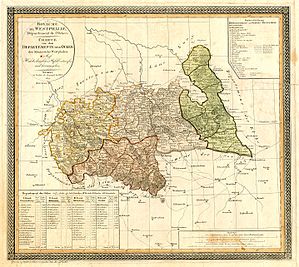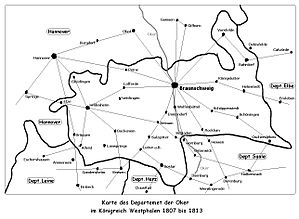Department of the Oker
| Department of the Oker | |
| Oker department | |
| Département de l'Ocker | |

|
|
| Basic data (1810) | |
|---|---|
| Consist: | December 1, 1807-1813 |
| Kingdom : | Westphalen |
| Prefecture : | Braunschweig |
| Residents: | 273,105 (1810) |
| Structure: | 4 districts |
| Prefects : |
Friedrich Henneberg († April 1812) August von Reiman (from February 1812) |
| Location of the department in the Kingdom of Westphalia | |

|
|
The Department of Oker (fr. Département de l'ocher , shortly Oker department or Okerdepartement ) was part of the period of French occupation existing 1807-1813 Kingdom of Westphalen . It got its name from the river Oker , which runs through most of the department. On September 1, 1810, there were minor border adjustments. The capital of the department was Braunschweig .
history
As a result of the lost battle of Jena and Auerstedt in October 1806 against the troops of Napoleon I , France took possession of the state of Braunschweig by two proclamations on October 28 and 30, 1806. The Peace of Tilsit followed on July 7, 1807, which resulted in the Kingdom of Westphalia on July 9, 1807, which existed until the end of October 1813. King was Jérôme Bonaparte , a brother of Napoléon.
The department of the Oker was formed from almost the entire principalities of Wolfenbüttel and Hildesheim, the city of Goslar and its area and some villages separated from the area of Magdeburg and Halberstadt. When it was founded on December 1, 1807, it had an estimated 267,878 inhabitants.
On September 1, 1810, as a result of the annexation of the northern German coastal states by France and the formation of the French Hanseatic Department , the boundary was changed by the formation of the Department of the Aller . The district of the Duchy of Lüneburg, which lies between the rivers Aller and Oker, became part of the Oker department.
After Napoléon's opponents (Prussia, Austria, Russia and Sweden) had won the Battle of Leipzig in mid-October 1813 , the Kingdom of Westphalia quickly disintegrated, and with it the Oker department.
On November 6, 1813, Johann Elias Olfermann entered the city of Braunschweig with troops from Brunswick and took over the business of government temporarily for Duke Friedrich Wilhelm , who finally took care of it himself when he moved into Braunschweig on December 22, 1813. Braunschweig had become a duchy again. After the Congress of Vienna (1814), it was finally confirmed within the old borders as the Duchy of Braunschweig.
State 1811
The Oker department covered about 5088 km². The population was counted as of December 31, 1810 with 275,654. They lived in 14 cities, eleven market towns, twelve suburbs, 572 villages, 79 hamlets and 130 individual buildings with a total of 37,381 fireplaces. The 87,437 city dwellers were compared to 188,181 rural dwellers. The department consisted of four districts, 56 cantons, 559 communes, 48 canton mairies and 58 peace courts. The appellate court was in Cassel . The capital of the department was Braunschweig.
- The Braunschweig district had 105,950 inhabitants and covered 1575 km² in four cities, four suburbs, 220 villages, 29 hamlets and 32 individual buildings with a total of 13,416 fire pits or 19 cantons and 206 communities. The district capital was Braunschweig.
- The Helmstedt district had 55,577 inhabitants and covered 1286.25 km² in four cities, three market areas, six suburbs, 123 villages, 13 hamlets and 34 individual buildings with a total of 7552 fire pits or twelve cantons and 121 municipalities. The district capital was Helmstedt.
- The Hildesheim district had 61,161 inhabitants and covered 955.25 km² in three cities, four market towns, a suburb, 136 villages, twelve hamlets and 22 individual buildings with a total of 9426 fire pits or 14 cantons and 134 municipalities. The district capital was Hildesheim.
- The district of Goslar had 52,966 inhabitants and covered 997.5 km² in three cities, four market areas, a suburb, 93 villages, 25 hamlets and 42 individual buildings with a total of 6987 fire places or eleven cantons and 98 municipalities. The district capital was Goslar.
On January 1, 1811, the following changes occurred for the Oker department: The canton of Rötgesbüttel came to the district of Braunschweig, the canton of Fallersleben to the district of Helmstedt. The Hildesheim district lost Elze to the left of the Leine, Sarstedt and Algermissen to the Aller department. Then there was the canton of Burgstemmen. In the Goslar district, the city of Goslar was divided into two cantons (city and country), and the canton of Langelsheim, also from the canton of Goslar, fell away.
structure
A Westphalian department was divided into districts, these in turn into cantons and these finally into municipalities.
| District | Cantons |
|---|---|
| Braunschweig | Peine-Stadt , Peine-Land , Groß Lafferde , Bettmar , Lesse , Gebhardshagen , Salder , Wolfenbüttel-Stadt , Wolfenbüttel-Land , Wolfenbüttel East (Salzdahlum) , Braunschweig City , Braunschweig East (Riddagshausen) , Braunschweig West (Vechelde) , Wendhausen , Kremlingen , Remlingen , Schöppenstedt and Jerxheim . |
| Helmstedt |
Königslutter , Schöningen , Warsleben , Hamersleben , Oschersleben , Harbke , Helmstedt-Stadt , Helmstedt Land , Weferlingen , Bahrdorf , Vorsfelde
from 1810 |
| Hildesheim |
1807–1813 until 1810 |
| Goslar | Vienenburg , Schladen , Goslar City , Goslar Land , Harzburg , Liebenburg , Salzgitter , Lutter , Holle , Bockenem and Lamspringe . |
Prefectures
The Oker department had its seat in Braunschweig. The first prefect of the department of the Oker was the Brunswick Friedrich Henneberg (1748-1812), who held this position until his death. He was followed by August von Reiman in office from May 1812 to around November 1813 . The prefect received support from his secretary Eschenburg. The respective prefect of the department was also prefect of the Braunschweig sub-prefecture.
The council meeting included Messrs Mahner, von Hantelmann, Lastrop and Gravenhorst. The council meeting of the sub-prefecture of Braunschweig included: 1810 von Cramm (President), Behrend-Krause, von Bülow, Campe, Cleve (only 1810), Denicke, Gerike, Giesecke, Kerl, Lynker, von Löhneisen, Lüntzel, von Münchhausen, von Plessen, Schachtrupp, Schader, Graf von Schulenburg on Outleben (until 1811), von Sierstorp and Rittmeister von Wilmerding.
There were other sub-prefects in:
- Helmstedt: the prefect Baron von Weichs with his secretary Düring, 1811 secretary Werner.
- Hildesheim: Prefect Blum with his secretary Heinichen, from 1812 Prefect Baron von Hammerstein.
- Goslar: The Prefect Mr. Kerl with his son as secretary. From 1811 Secretary von Boetticher.
A French civil servant who served in Braunschweig from 1806 to 1808 was the writer Marie-Henrie Beyle (1783–1842), who later became known under his pseudonym “ Stendhal ”. In his diaries ( diary from Braunschweig ) and travel reports ( impressions from Northern Germany ) he provided an essayistic description of Braunschweig society at that time. His stay in Germany, but especially his memories of Braunschweig, he later processed (partly in encrypted form) in further novels .
Postmaster in the department of the Oker
The Kingdom of Westphalia had postal sovereignty in the country.
Braunschweig
- Braunschweig Director 1st class: Cleve (1810-13), - Director for the mail from Hamburg to Leipzig: Henneberg (1810), Controleur d'Escalonne, (1810), De Berenger (1811-13)
- Lafferde Expeditioner: Böttcher (1810-13)
- Peine Director 2nd class: Richelmann (1810-13)
- Schöppenstedt Director of Expeditor: Dehn (1810–13),
- Wolfenbüttel Director 3rd class: Salzenberg (1810-13)
- Brüggen expeditor: Rohrsen (fils), (1811–13)
Helmstedt
- Bahrdorf Schulze Expeditioner: (1810-13)
- Helmstedt Director 2nd class: Böcker (1810–13)
- Königslutter Expediteur: Falke (1810–13)
- Oschersleben Expeditioner: Evers (1810–13)
- Schöningen Director of Expeditions: Schultze (1810–11), Sachtleben (1812–13)
- Vorsfelde shipping agent: Kaulitz (1810–13)
- Rocklum Expediteur: Schliephacke (1810–13)
Goslar
- Bockenem Expediteur: Hausdoerffer (1810–13)
- Goslar Director 2nd class: Tüngel (1810), De Fauquenont, (1811-13)
- Lamspringe expeditor: Meyer (1813)
- Salzgitter Director of Expeditions: Sievers (1810–13)
- Beinum (Salzgitter) shipping agent: Schleisener (1810–13)
- Immendorf (Salzgitter) Shipping agent: Niehoff (1810–13)
- Schladen shipping agent: Köller (1810–13)
Hildesheim
- Alfeld director-expeditor: artist (1810-13),
- Hildesheim Director 1st class: Metz (1810–13), Controleur Derling (1810–11)
- Lutter am Barenberge Expeditioner: Südekum (1810–13)
See also
- Directory of the Duchy of Braunschweig in the Kingdom of Westphalia
- List of the departments in the Kingdom of Westphalia
literature
- 1807 (4) Royal decree ordering the division of the kingdom into eight departments. Cassel, December 24, 1807.
- 1810 (78) Royal decree of July 19, 1810, which decreed the composition of the three départements, which were formed from the former Hanoverian provinces, and the union of some other parts of the kingdom with them. (79) ... determines the time ... [As of September 1, 1810].
- 1808 (No. 36) Kgl. Decree regarding the division of the city of Braunschweig into three cantons. May 17, 1808.
- Georg Hassel, Court and State Handbook of the Kingdom of Westphalia. Hahn brothers, Hanover 1811.
- Dorothea Puhle, Das Herzogtum Braunschweig-Wolfenbüttel in the Kingdom of Westphalia, (= supplements to the Braunschweigischer Jahrbuch, vol. 5), Braunschweig 1989.
- Luitgard Camerer , Manfred Garzmann , Wolf-Dieter Schuegraf (eds.): Braunschweiger Stadtlexikon . Joh. Heinr. Meyer Verlag, Braunschweig 1992, ISBN 3-926701-14-5 .
- Horst-Rüdiger Jarck , Gerhard Schildt (ed.): The Braunschweigische Landesgeschichte. A region looking back over the millennia . 2nd Edition. Appelhans Verlag, Braunschweig 2001, ISBN 3-930292-28-9 .
Web links
Individual evidence
- ↑ a b Court and State Handbook of the Kingdom of Westphalia. 1811.
- ^ Stendhal: Diary from Braunschweig . In: Confessions of an Ichmenschen , Propylaea, Berlin 1923
- ↑ Stendhal: Impressions from Northern Germany . In: Confessions of an Ichmenschen , Propylaea, Berlin 1923
- ^ Hans Mattauch (Ed.): Stendhal: Testimonials from and about Braunschweig (1806-1808) , Publishing House for Regional History, Bielefeld 1999, ISBN 978-3-89534-283-7
- ^ Almanach royal de Westphalie. Cassel, 1810-1813
